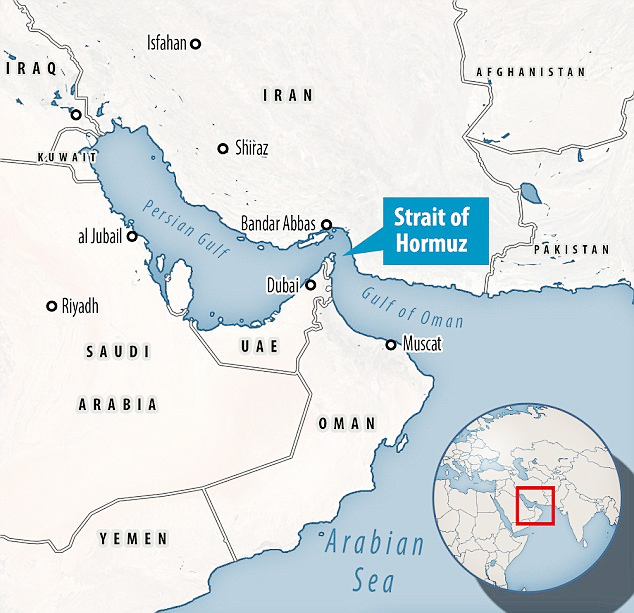Iran Steps Up Uranium Enrichment | 05 Jan 2021
Why in News
Recently, Iran has resumed enriching uranium up to 20% in violation of the 2015 nuclear deal and also seized a South Korean-flagged tanker near the crucial Strait of Hormuz.
- Meanwhile, the USA has decided to keep nuclear powered aircraft carrier Nimitz in the Gulf region in the wake of threats from Iran.
Key Points
- Uranium Enrichment:
- Natural uranium consists of two different isotopes - nearly 99% U-238 and only around 0.7% of U-235.
- U-235 is a fissile material that can sustain a chain reaction in a nuclear reactor.
- Enrichment process increases the proportion of U-235 through the process of isotope separation (U-238 is separated from U-235).
- For nuclear weapons, enrichment is required upto 90% or more which is known as Highly Enriched Uranium/weapons-grade uranium.
- For nuclear reactors, enrichment is required upto 3-4% which is known as Low Enriched Uranium/reactor-grade uranium.
- Natural uranium consists of two different isotopes - nearly 99% U-238 and only around 0.7% of U-235.
- 2015 Nuclear Deal:
- In 2015, Iran with the P5+1 group of world powers - the USA, UK, France, China, Russia, and Germany agreed on a long-term deal on its nuclear programme.
- The deal was named as Joint Comprehensive Plan of Action (JCPOA) and in common parlance as Iran Nuclear Deal.
- Under the deal, Iran agreed to curb its nuclear activity in return for the lifting of sanctions and access to global trade.
- The agreement allowed Iran to accumulate small amounts of uranium for research but it banned the enrichment of uranium, which is used to make reactor fuel and nuclear weapons.
- Iran was also required to redesign a heavy-water reactor being built, whose spent fuel would contain plutonium suitable for a bomb and to allow international inspections.
- In May 2018, the USA abandoned the deal criticising it as flawed and reinstated and tightened its sanctions.
- Since sanctions were tightened, Iran has been steadily breaking some of its commitments to pressure the remaining signatories to find a way to provide sanctions relief.
- In 2015, Iran with the P5+1 group of world powers - the USA, UK, France, China, Russia, and Germany agreed on a long-term deal on its nuclear programme.
- Issues Involved:
- The dual incidents come amid heightened tensions between Iran and the USA.
- Enrichment could shorten Iran's time it would take to develop a nuclear bomb.
- Israel criticised Iran’s enrichment decision.
- Iran’s decision to begin enriching to 20% purity a decade ago nearly triggered an Israeli strike targeting its nuclear facilities, tensions that only abated with the 2015 nuclear deal.
- A resumption of 20% enrichment (at fordow facility) could see that brinkmanship return as that level of purity is only a technical step away from weapons grade levels of 90%.
- Brinkmanship is the art or practice of pursuing a dangerous policy to the limits of safety before stopping, especially in politics.
- Previously the International Atomic Energy Agency (IAEA) expressed serious concerns over Iran's blocking of inspections of two suspect locations of Uranium enrichment for more than four months.
Strait of Hormuz
- Geographic Location:
- It is the waterway separating Iran and Oman, linking the Persian Gulf to the Gulf of Oman and the Arabian Sea.
- On the north coast lies Iran, and on the south are the UAE and Musandam, an enclave of Oman.
- The Strait is 21 miles wide at its narrowest point, but the shipping lane is just two miles wide in either direction.
- Importance:
- The Strait of Hormuz is one of the world’s most strategically important choke points.
- Two-thirds of the oil and half the Liquefied Natural Gas (LNG) Indian imports come through the strait between Iran and Oman.
- As much as 18 million barrels of oil pass through the Strait of Hormuz every day, accounting for one-third of the global oil trade.
- A third of the world’s LNG trade also passes through the strait.
- Issues in the Strait:
- The strait of Hormuz plays a vital geopolitical role to the point where the US Fifth Fleet guards this strait.
- During the recent years, Iran has threatened the safe passage of oil tankers in this strait.
Way Forward
- All countries part of the 2015 deal should engage constructively and resolve all issues peacefully and through dialogue.
- Both the USA and Iran must act with strategic restraint as any crisis in West Asia will not only affect the region as a whole but will have a detrimental impact on global affairs as well.

